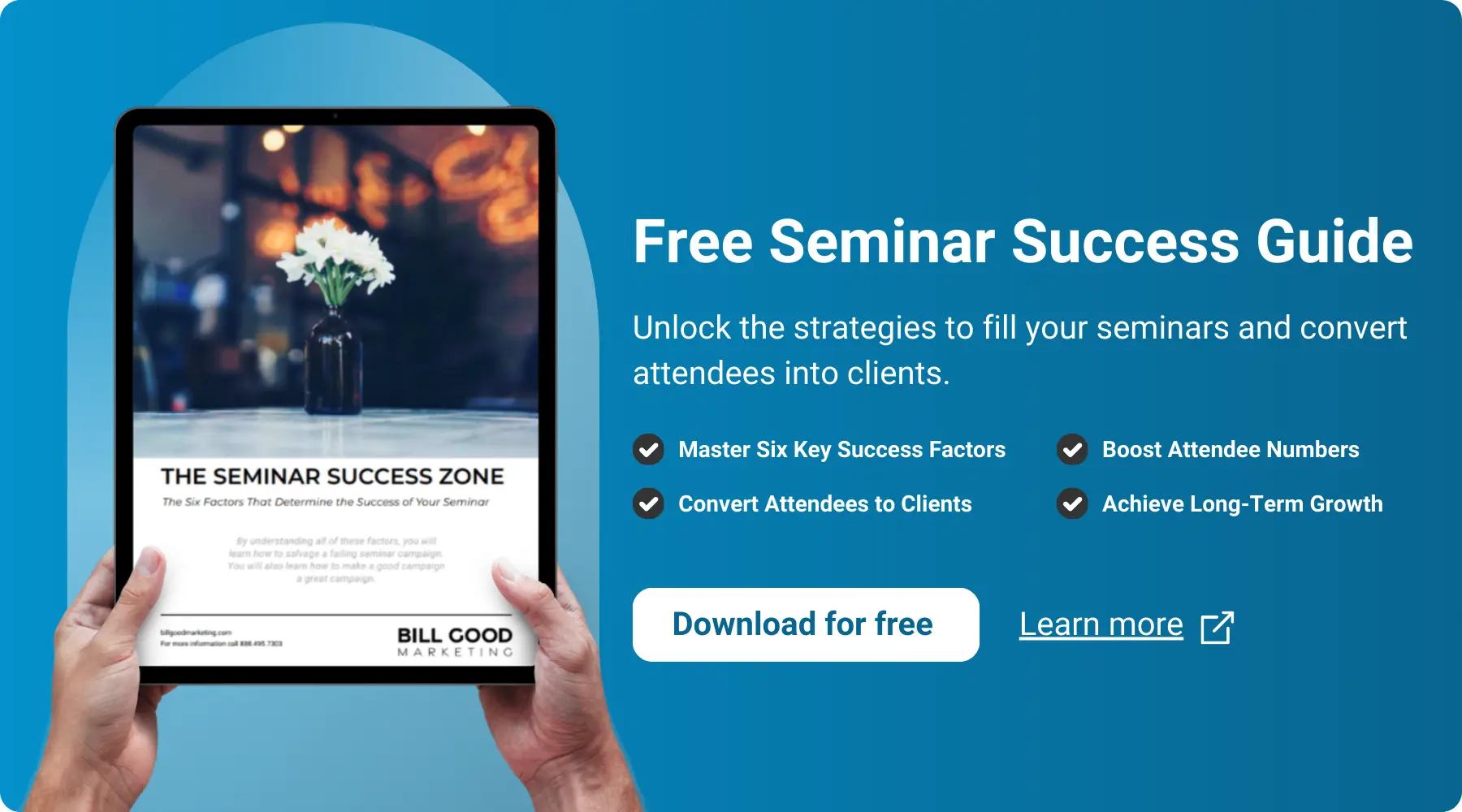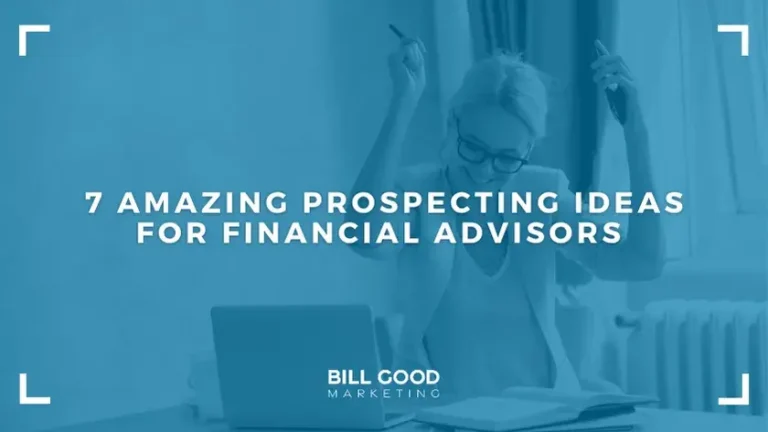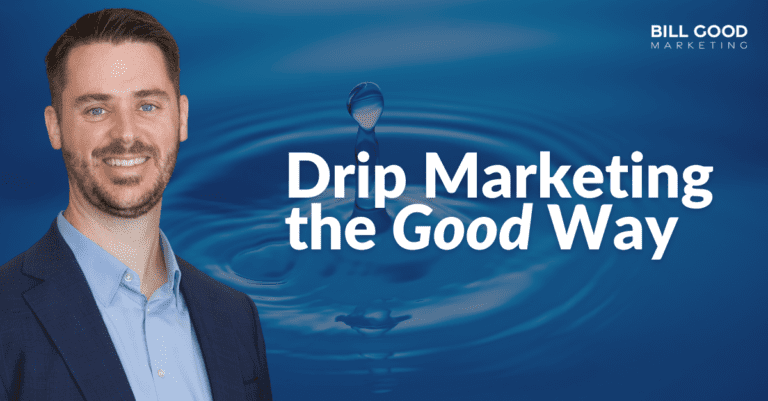Imagine a future where your phone rings with new opportunities, not because you chased them, but because they found you through the power of a meticulously crafted prospecting strategy.
This isn’t just about finding clients; it’s about attracting the right clients through innovative outreach and content marketing efforts that speak directly to your target demographic.
As we explore these eight prospecting techniques, remember that the goal is not just to grow your client base, but to revolutionize the way you connect with potential clients. This is about building relationships that are rooted in trust, value, and mutual respect.
With the right approach, your prospecting strategy will not only define your success as a financial advisor or CFP® but also enrich the lives of those you serve.
Let’s embark on this journey together, ready to embrace the possibilities that await. So, without further ado we present you with:
7 Financial Advisor Prospecting Ideas You Can Launch This Year
1. Referral Marketing
Referral marketing as a financial advisor is simple: It’s the process of getting your clients to tell their friends and family members about you, and vice versa. It is the steps and best practices for letting your clients know that you value and accept referrals – and for creating the kind of relationship that makes them want to refer people to you.
Here’s what referral marketing isn’t: Asking for referrals.
Asking for referrals does not work. At best, your client will give you a name just to get you off their back. But a name is not a referral. At worst, your client will be uncomfortable or even upset that you did ask. It puts them on the spot. It puts the pressure on them to help you – when the whole point of your relationship is that you help them.
Asking for referrals is bad. Don’t do it.
That’s why you should promote referrals instead.
What’s the difference between promoting a referral and asking for one? Simple. Asking goes like this:
“Who do you know that might need financial advice?”
Promoting goes like this:
“By the way, if you ever know anyone who needs help with their finances like the way we help you, please don’t hesitate to let me know. We love working with more people just like you!”
Promoting is a lot more pleasant than asking, and if done gently, consistently, and in a variety of ways, is a lot more effective.
2. Cloning
To “clone” means to “create identical copies.” In this channel, you are trying to make copies of your ideal clients. This is done by getting introductions to people that your clients know.
Introductions are similar to, but distinct from, referrals. A referral is when a client tells you about someone they know that you should talk to – or tells that someone that they should talk to you. An introduction, on the other hand, is when a client physically introduces you to someone in person.
In other words, if your client, Bob, says,
“You should talk to my brother, Frank,”
That’s a referral.
If he says,
“[Your name], meet my brother, Frank. Frank, meet my financial planner, [Your name].”
That’s an introduction.
An introduction isn’t necessarily better than a referral, but it’s a faster, more direct path to forming a new relationship. Think of it as a form of networking. Many of the top wealth management professionals we know devote almost all their marketing efforts to cloning. They reason – correctly – that the most valuable prospects out there are the people they already have a connection with…through their current clients.
How do you start cloning you ask?
First, review your entire list of current clients.
Choose ten that you want to clone. Then, try to find out the names of their:
- Parents
- Adult children or other beneficiaries
- Siblings
- Fellow hobby enthusiasts (who they play golf with, go fishing with, etc.)
- Other professionals, like their attorney, CPA, real estate agent, etc. (This will come in handy when we get to strategic partnerships.)
Once you have found who some of these people are, you have a relationship map of your top ten clients. These are the clients you will try to clone – by getting introductions to the people you’ve uncovered.
Then take those clients to a special birthday lunch in their honor – and invite a select number of their friends and family.
Birthday lunches are an effective way to get introductions. In fact, they are probably the easiest to get started! If you have done a thorough job with your relationship mapping, you can ask if your client might like to invite certain people you know that they know that you want to know. It’s as simple as saying:
“Hey, Jack, I know your sister Jill lives in town. Why don’t you invite her to come celebrate your birthday with us?”
The data we have compiled over the years suggest that financial advisors can average around one new client for every birthday lunch, provided that you get your client to bring along 2-3 people. To start, we recommend focusing on your best clients who are celebrating milestone birthdays. (If you invite someone to a 58th birthday lunch, they’ll expect a similar invite for their 59th.)
3. Strategic Partners
No source of organic growth has a higher ceiling than strategic partners. What exactly is a strategic partner? Well, according to our founder, Bill Good:
A genuine strategic partnership is two non-competitive professionals united for the benefit of their mutual clients who also refer business to each other.
We say genuine because there are two truths about strategic partners. The first is that strategic partners are an incredibly valuable source of high-quality referrals. Many of the top financial advisors in the industry bring in tens of millions in new AUM every year from their strategic partnerships alone. One long-time client of ours, Rob Rose, has doubled his business three times, largely thanks to his strategic partner network. In fact, one year not long ago, he brought in roughly $100M in new assets!
The second truth is that genuine strategic partners are surprisingly rare. Most, in fact, are not true strategic partners at all, but rather a “strategic one-way street.” That means all the referrals flow one way (usually from you) but not the other.
The best strategic partners tend to be other professionals your clients already work with. Your job is to identify those professionals. Specifically, you should look for the following:
- CPAs, especially for business owner clients, high net worth clients, and those with complicated returns.
- Tax Preparers, for clients with simpler returns.
- Estate Planning Attorneys, especially for those clients with large or complex estates.
- Attorneys, especially those who focus on elder care, family law, and/or divorce.
- Real Estate Agents, especially for those clients who own commercial property.
- Insurance Agents, if you do not already have an insurance component to your own financial advisory.
Here is the simplest way to make a list of your clients’ other professionals. The next time a client comes in for a meeting or review, ask them who they work with from the list above. Be sure to explain why you’re asking: Because you want to coordinate with their other advisors so that you can help them reach their financial goals more effectively. NOT because you want more referrals!
4. Social Connections
A social connection is someone you know by name, and who knows you, but does not necessarily know or think of you as a financial advisor. Additionally, a connection must be someone you want to do business with but would feel uncomfortable soliciting their business directly. Think of your neighbor who is a partner in a well-known legal practice. The couple that always sits behind you at church who own their own restaurant. Fellow members of your local PTA. You get the idea.
If you’re like most retirement planning professionals, you probably have dozens, perhaps hundreds of connections – many of whom have a lot of money to invest. But there’s a problem with prospecting to your social connections. You can’t exactly turn to the person you know in church who owns a thriving car dealership and say, “Hey, Bob, tell me about your investment strategy. Do you need any help?”
If you do this kind of thing more than once, you’ll soon develop a reputation as someone who takes advantage of relationships. Before you know it, people will find an excuse to say, “Sorry, can’t talk, gotta run” before you even open your mouth. You’ll likely find yourself standing alone by the punch bowl at parties. The fact is, there’s a social taboo against soliciting people you know.
But that doesn’t mean you can’t ever do business with them.
The key to developing your connections into full-blown prospects is to maintain top-of-mind awareness (TOMA) with them. This means keeping your name in front of them. It means very gradually educating them on what you do. That way, when the day comes when your connections need financial advice, they will think of you first.
Since it is considered bad manners to solicit people you know, let’s just not do it. That means never or rarely asking for anything. The only exceptions to this rule are:
- It’s okay to invite your connections to client appreciation events (so long as there is no pressure to buy or do anything at these networking events).
- It’s okay to ask your connections if they want to continue receiving direct mail from you. (More on this later.)
5. Seminars
If your goal is to grow aggressively, seminars should be the first channel you consider. That’s because there is no other channel that can put you in front of more of your target market in a shorter amount of time. Over the years, we’ve worked with scores of advisors who have built $500M to $1B practices through seminars alone – and yes, they still work! One advisor we coach, a young man still in his early thirties, raised $70M from seminars alone in 2019. We also coach many other financial advisors who bring in $30-50M in new business every year through seminars, in both urban and rural markets.
On the other hand, while seminars are undoubtedly a great way to get in front of your target audience, they can also be expensive and time-consuming. So, there are a few principles you need when considering them.
- First, if you’re going to do seminars, you must commit to doing seminars. Doing just one seminar here and there will not lead to growth. Instead, hold seminars on a regular basis. This will help you tweak your seminars over time, as more than likely, you’re fifth and sixth events will be far better than your first and second, and so on.
- Second, we highly recommend you implement the dinner seminar model. This means you’ll be paying for prospective clients to eat dinner at a nice restaurant before they listen to your presentation. Yes, that will drive costs up. Yes, you will get some plate lickers – people who are only there for the food. It doesn’t matter. There is a social contract involved here, where if you want high-net-worth individuals to give you two hours of their time, you better make it worth their while in the form of a great meal.
- Third, to be successful with seminars, you must run them by the book. Meticulous planning is the only way to ensure a professional production. Your invitation, your presentation, your location, and everything else demands attention to detail. Success also requires you to have a team in place to help stage the seminar, manage the appointments you generate, and handle your follow-up process. Otherwise, you’ll have to do it all yourself – and we’ve never met a financial advisor who could do that for long.
- Finally, to maximize your return on investment, it is important to understand that the purpose of holding seminars is to: GET APPOINTMENTS!
You don’t hold seminars to educate people. You don’t even hold seminars to get new clients. This is done in the closing process. Very simply, you hold seminars to get prospects to set an appointment with you in your office.
If you do these things, you will succeed – and success in seminars can absolutely blow the roof off what you thought you could accomplish.
A Note on Webinars – Not a Direct Replacement for Seminars
Yes, webinars are convenient. They’re cost-effective and can reach a wide audience with minimal effort. But here’s the thing: they’re not seminars. While webinars are useful for sharing knowledge and building awareness, they don’t deliver the same impact when it comes to prospecting.
The reason?
Webinars are a low-commitment environment. People can tune in or tune out. Seminars, on the other hand, require a higher level of engagement—there’s a commitment, a connection, and a personal interaction that webinars simply can’t replicate. If you want appointments, seminars are still your heavy hitter.

6. Cold Calling
Make no mistake, cold calling still works. It’s certainly trickier than it used to be, but if you rigorously apply the principles of what we modestly call the Good Way to Cold Call, you can still have outstanding success with this channel. For example, one advisor we coach raised $36M in new assets in 2019, mostly from cold calling. And this isn’t some grizzled veteran who has been cold calling since the 1980s. No, this advisor is in his early thirties!
The reason cold phone call is still a viable channel is because it remains one of the fastest, most direct ways to fill your pipeline with leads – again, if you do it right. While seminar marketing is probably the king in this area, the big difference between seminars and cold calling is that seminars can be expensive.
Cold calling isn’t.
7. Digital Marketing
Once upon a time, when somebody wanted something, they opened the Yellow Pages to see who offered it in their area.
These days, people go on Google instead…not to mention social media platforms like Facebook, LinkedIn, and Twitter.
While most of your prospects will continue to come from traditional areas (like referrals, seminars, etc.), you can bet that pretty much every new prospect you generate will look you up online. They’re testing you to see if you’re worth spending any time on. To see if you offer what they need. To see if you’re the type of person they normally associate with.
For that reason, you need a digital marketing strategy to ensure you look good to people who find you online.
There’s another reason you need to start paying attention to digital and social media marketing.
While the internet has now been around for decades, for the financial services industry, it’s still a relatively untapped oilfield. But every year, more and more financial advisors are generating more and more leads purely through online means. So, it’s time to start actively getting new leads to come to you instead of just you to them.
In other words, you need to look good and be found.
At this point, we personally would not recommend that any financial professional make digital, podcasts, or email marketing their primary lead generation channel. It’s simply too passive compared to more mature approaches like the ones outlined above. What we do recommend is that every advisor make digital marketing an adjunct channel of prospecting. In fact, many of the top financial advisors we coach are finding that strengthening their digital marketing helps boost their success in other channels, like seminars.
Through digital marketing and search engine optimization (SEO), the top financial advisors are now connecting with more potential prospects than ever before. Through digital marketing, these same advisors are now engaging these potential prospects, to the point they will then:
- Attend a seminar
- Request to receive more information
- Ask mutual acquaintances about you
- And much more!
Launch a Full-Fledged Prospecting System with Bill Good Marketing
In the ever-evolving landscape of financial planning, where the stakes are high and the competition fierce, one truth remains unchanged: your ability to attract and retain clients defines your success.
This is where we, at Bill Good Marketing, introduce a revolutionary change—a comprehensive marketing system designed to catapult your prospecting efforts into a new era of growth and efficiency.
Imagine a world where every effort you make is seamlessly integrated, where every strategy is precisely targeted, and where every outreach effort pays dividends in the form of high-value clients. This isn’t a distant dream; it’s the reality we offer through our unparalleled prospecting system, which stands at the core of our end-to-end solution.
Why settle for ordinary when you can achieve the extraordinary? Our system is not just a tool; it’s a promise of potential, a beacon of possibility in the competitive world of financial advising. With our CRM, the art of attracting the right clients and cultivating centers of influence becomes not just possible, but effortless.
But don’t just take our word for it.
Our testimonials speak volumes, echoing the success stories of countless financial advisors who’ve transformed their prospecting efforts and seen their practices soar to new heights. These stories are not just endorsements; they are invitations to join a community of successful professionals who’ve made the leap from good to great.
Your journey towards unparalleled success in financial planning begins with a single, decisive step: contacting us. With our value proposition, you’re not just investing in a system; you’re embracing a partnership that promises to guide you towards your goals with precision and grace.
The future is bright, and the path to success is clear.
Contact us today to discover how our CRM and comprehensive marketing strategies can revolutionize your approach to effective prospecting and client management. Let Bill Good Marketing be the key to unlocking your full potential. Your next level of success is just a conversation away. Reach out now, and let’s embark on this journey to greatness together. (Our contact information can be found here.)
About the Author

Andrew D. White is the Director of Marketing at Bill Good Marketing, a firm with over 45 years of experience helping financial advisors scale their businesses. With deep expertise in advisor marketing, client acquisition, and retention strategies, Andrew specializes in creating high-impact campaigns that drive measurable results. His insights are grounded in real-world experience, working alongside top-performing advisors to refine prospecting, branding, and practice management strategies.




